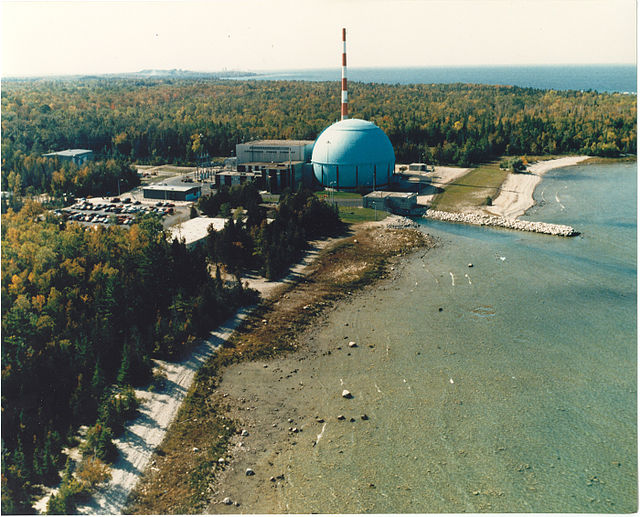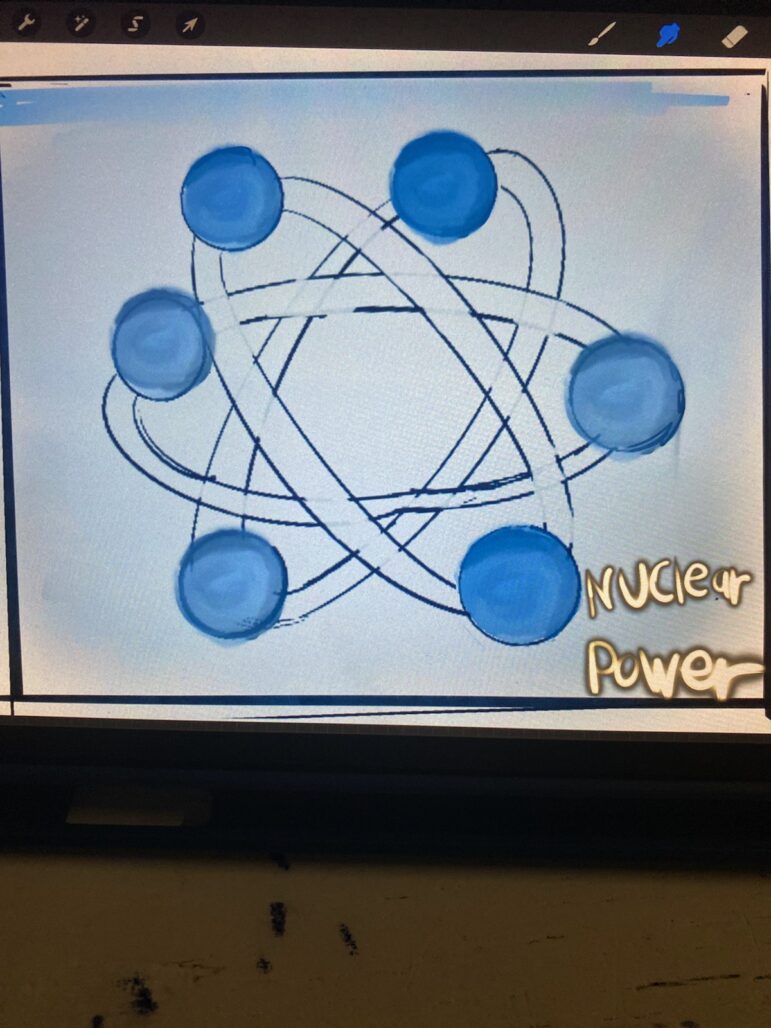By EMILIE APPLEYARD
Capital News Service
LANSING — Eight nuclear reactors at six sites have been shut down permanently in the Great Lakes region.
Of them, only one, Big Rock Point in Charlevoix, has been fully decommissioned. All that remains on its 500 acres are eight spent fuel tanks, and the federal government has deemed the land safe for unrestricted use.
It’s common for closed nuclear plants to be considered “abandoned,” according to Jerry Nappi, the director of corporate communications at Entergy, a company that owns multiple plants,
“Commercial nuclear power plants are not abandoned. By law, there are trust funds for each commercial reactor in the country,” Nappi said. “Those funds can only be used for approved decommissioning, dismantling and remediation purposes.”

Wikipedia Commons
The Big Rock Point Nuclear Power Plant in Charlevoix was decommissioned in 1997.Proper decommissioning takes approximately 30 years to complete.
Some plants, such as the Palisades Nuclear Plant in Covert, have experienced multiple accidents.
Most recently, in 2019, Palisades had a leaky refueling tank that drained 79 gallons of “slightly” radioactive water into Lake Michigan, said the Nuclear Regulatory Committee (NRC).
According to the NRC, although the amount of radioactive waste was so minuscule it did not cause any damage to the water quality or environment, it still raised concerns about the overall safety of procedures at nuclear plants like Palisades.
The NRC says that production of nuclear power is harmless to the environment when done correctly. It is only when mishaps, like those at Palisades occur, that damage can occur.
Entergy has announced that it will close Palisades this spring.
Val Gent, a senior communications specialist at Palisades, said the closure decision was made from a business standpoint.
“The closure of Palisades is part of Entergy’s business strategy to exit from the wholesale nuclear generation business and move to being a pure play utility company,” Gent said.
Gent said Entergy will transfer ownership of Palisades to Holtec International for decommissioning after the permanent shutdown and reactor defueling.
Florida-based Holtec International builds equipment for nuclear plants and handles waste management and the proper decommissioning of plants.
As with Palisades and Big Rock, many other old nuclear plants are located right along the edge of the Great Lakes.

Asher Freedman
Can decades old, unused plants have a lasting effect on the nearby water and its environment?
According to the International Joint Commission, the best-known effect the generation of nuclear power has on water quality in the Great Lakes is the production of radionuclides, which are radioactive atoms.
The United States and Canada created the International Joint Commission to manage and protect the waters shared by the two countries.
While radium, radon and uranium are the most common radionuclides, tritium is the most common one in the Great Lakes. Most radionuclides occur naturally at low levels and pose no threat to human health, experts say.
However, exposure to high levels of radionuclides for an extended period can be dangerous to human health.
According to Texas A&M AgriLife Extension, such health problems include cancer, kidney disease, bone growths, liver disease, cataracts, osteoporosis, impaired immune systems and anemia.
Strict procedures and laws set by the NRC and other agencies are intended to ensure that U.S. nuclear plants operate and decommission in a way that is safe for the environment and public.
For example, since 2006, U.S. nuclear plants have had groundwater protection programs to help manage situations where radionuclides could get released. Nuclear plant operators are required to monitor for radioactivity in water supply, food sources and shoreline sediments.
While no accidents at nuclear plants in the Great Lakes region have had a severe impact on water quality, government officials are still debating the proper way to store nuclear fuel and the impacts it can make.
Recently, U.S. and Canadian officials have disagreed about Canada’s plan to store spent nuclear fuel 1,600 feet below ground in land only 30 miles from Lake Huron.
U.S. lawmakers said the plan fails “to prioritize the health of the Great Lakes and the 40 million residents who depend on it for clean drinking water.” U.S. Rep. Dan Kildee, D-Flint, heads a 20-member, bipartisan group calling on the Biden Administration to stop the Canadian government from being able to store waste in the Great Lakes Basin.
It’s estimated that Canada plans to store 57,000 tons of highly radioactive material in the Great Lakes Basin, according to a report by the Nuclear Waste Management Organization.
In an October 2021 public statement about the ongoing legal battle between U.S. and Canadian officials regarding the future of Enbridge’s Line 5 pipeline, Gov. Gretchen Whitmer accused the Canadian government of “adding even more risks to our waters.”
Despite concerns expressed by U.S. government officials, farmers and landowners in the basin, Canada is still moving forward on the project.
Emilie Appleyard writes for Great Lakes Echo.